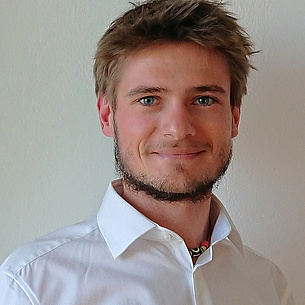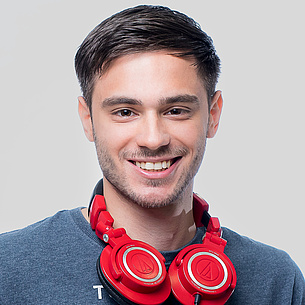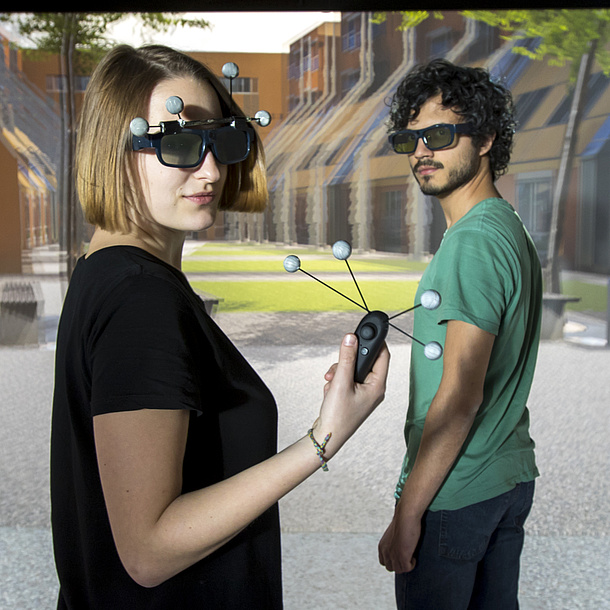Quick Facts
- Duration of study: 4 semesters
- ECTS credit points: 120
- Academic degree:
Diplom-Ingenieurin
orDiplom-Ingenieur
(Dipl.Ing. or DI), equivalent to the Master of Science (MSc) - Language of instruction: English
The Master's Programme
In the master's degree programme Information and Computer Engineering, you will learn the essential theories, principles, and methods applied in information processing and information technology. You will learn how to independently model, design, implement, operate, and evaluate complex hardware and software systems in the IT sector. In specialist areas such as “Visual Computing” or “Embedded and Automotive Systems”, you will learn more about topics that will be of vital importance in the future, such as drones with high-resolution cameras, 3D models for medicine, lane-keeping assist systems, or autonomous driving technology.
This degree programme differs from other degree programmes offered in the IT field in that it has been designed as a generalist graduate programme, i.e. a general education in the subject of information and computer engineering is provided. Thus, by the end of your studies, you will have a broad, detailed, and critical understanding in several areas of specialisation.
Students have access to excellent research infrastructure, which includes:
- Computer labs
- An embedded systems lab (hardware)
- A virtual reality lab: DAVE
- A robotics lab at the Institute of Software Technology: Students work in robotics and have the opportunity to build, control, and program robots.
Play video
Choose from many different majors and minors.
Focus Areas
Students have a great deal of freedom while choosing their course content. A mentor who is responsible for the subject area will be on hand to provide advice.
The master's degree programme in Information and Computer Engineering consists of
- a primary subject (major),
- a secondary subject (minor),
- an elective subject,
- a seminar/project,
- a free-choice subject, and
- a master‘s thesis.
You can specialise in the following areas:
Information Security: You will face the challenge of making the digital world secure and learn, for example, how to create secure systems such as ATM cards or chips. You focus on the practical aspects of implementing and using security mechanisms.
Software Technology: You will learn advanced techniques needed to develop complex and critical software. This subject covers the areas of analysis, design, validation, and verification. In addition, you will learn how to apply artificial intelligence techniques in software engineering, as well as cover programming languages and compiler construction.
Visual Computing: You will acquire knowledge about computer graphics, image processing, geometric modelling, virtual and augmented reality, and information visualisation. In addition to mastering the theoretical basics, you will primarily learn how to practically apply your knowledge. The application areas range from medicine to industrial automation.
Robotics and Intelligent Systems: You will learn methods that can be used to develop intelligent robots and intelligent systems. You will acquire basic theoretical knowledge about navigation, computer vision, machine learning, knowledge representation, decision-making, and language comprehension. In addition, you will learn how to design, implement, and validate intelligent systems.
Signal Processing and Human Communication: Our signal perception enables us to hear, see, speak, feel, think and regulate all our life processes. We have also taught our communication and information devices, cars and machines how to detect and respond to them. You will learn about algorithms used in signal processing and highly integrated information technology systems that will be used in the future.
Communications and Mobile Computing: More and more everyday objects and environments are being equipped with computer systems. This development is reflected by developments in the Internet of Things and cyber-physical systems. You will learn fundamental information about and the applications of these systems. For example, you will acquire knowledge about radio-based communication technologies, self-organising sensor networks, and the development of smart services for mobile systems.
Embedded and Automotive Systems: You will acquire knowledge about the design, creation, and analysis of embedded systems. You will examine the hardware and software and learn how they are applied in electronic and mechanical environments, such as vehicles, cyber-physical systems, sensors, actuators, and the Internet of Things.
Measurement and Control Systems: You will learn how to effectively apply methods to create mathematical models for technical systems and gain a broad knowledge foundation about the algorithms used for digital simulation, as well as their use to perform practical tasks. You will deepen your knowledge of methods used to systematically designed control systems and how these systems are practically implemented.
Microelectronics and IC Design: You will deepen your knowledge of semiconductor physics and integrated circuit technology. You will learn how to independently develop electronic devices and systems, from the point of product specification to product commissioning. You will also consider modern concepts such as simulation techniques, as well as interactions that can occur with other systems and the environment (EMC).
Business, Law and Management: You will receive basic management training and learn, for example, the basics of setting up and running a business.
Alternatively you can choose the Major in Internet of Things.

I’m interested in defining the true essence of things, digging right down to the core of the matter, and teasing out what’s hidden behind a line of code. I was able to do all these things and more in the master’s degree programme in Information and Computer Engineering offered at TU Graz. The degree programme is a successful mixture of theory and application, in which hardware and software are smoothly united to create an exciting symbiosis. The master's programme allows for a great deal of freedom of choice: Students can shape the curriculum to fulfil their own wishes and meet their expectations. I was particularly fascinated by the Internet of Things.
Collaborations and Networks
International exchange with scientists plays an important role in the master's programme. Contributions from professors from other countries enrich the degree programme, and stays abroad are actively promoted.
Students have an opportunity to gain insights into practical aspects of their field during the course of their studies. This is made possible by the successful cooperation with national and international industrial partners, such as AVL, Siemens, AMS, and partners in Silicon Valley.
Admission
The prerequisite for admission is a completed bachelor’s degree in a relevant subject (see curriculum).
Additionally, you need to provide evidence of competence in the English language.
1. Admission Procedure
Admission without admission procedure
The following categories of applicants are eligible for the master’s programme without an admissions procedure:
- students, who have already been admitted to one of the following Master's programmes at TU Graz:
- graduates of the following bachelor’s programmes at TU Graz:
- graduates of the following programmes at other universities: List of approved Bachelor's programmes
Graduates of other programmes offered at TU Graz can apply for admission at the Registrar's Office.
Admission with admission procedure
Graduates of a previous study programme not mentioned above undergo an admission procedure.
Registration for the academic year 2026/27: 15 October to 15 December 2025
You can complete the admission procedure before the end of your bachelor’s studies.
2. Admission
- Admission and deadlines for international students
- Admission and deadlines for Austrian students who are registering to study at TU Graz for the first time
If you have already been admitted to a degree programme at TU Graz, or have studied at TU Graz before, please come to the Registrar's Office in person to complete your admission during the admission period.
Fragen zur Zulassung?
Contact study@tugraz.at
Career Prospects

I particularly enjoyed that I could select various subjects and courses, specifically tailoring the study plan to my interests.
Working on my master's thesis perfectly prepared me for cutting-edge research and my current occupation as a researcher and PhD student in the field of virtual reality. It also laid the foundation for research internships abroad.
Professional Fields
Graduates of the Information and Computer Engineering degree programme have excellent job prospects and are in demand both nationally and internationally:
- You carry out research at universities, other research institutions, and R&D departments in industry.
- You design, operate, and evaluate complex hardware and software systems in the field of information technology, the automotive industry, and telecommunications.
- The systems you design are used, for example, in smartphones and apps or in robotic systems.
- You found your own business or work as employees, e.g. in industry, in new start-up companies, or in the service sector.
- You often lead departments or projects.


